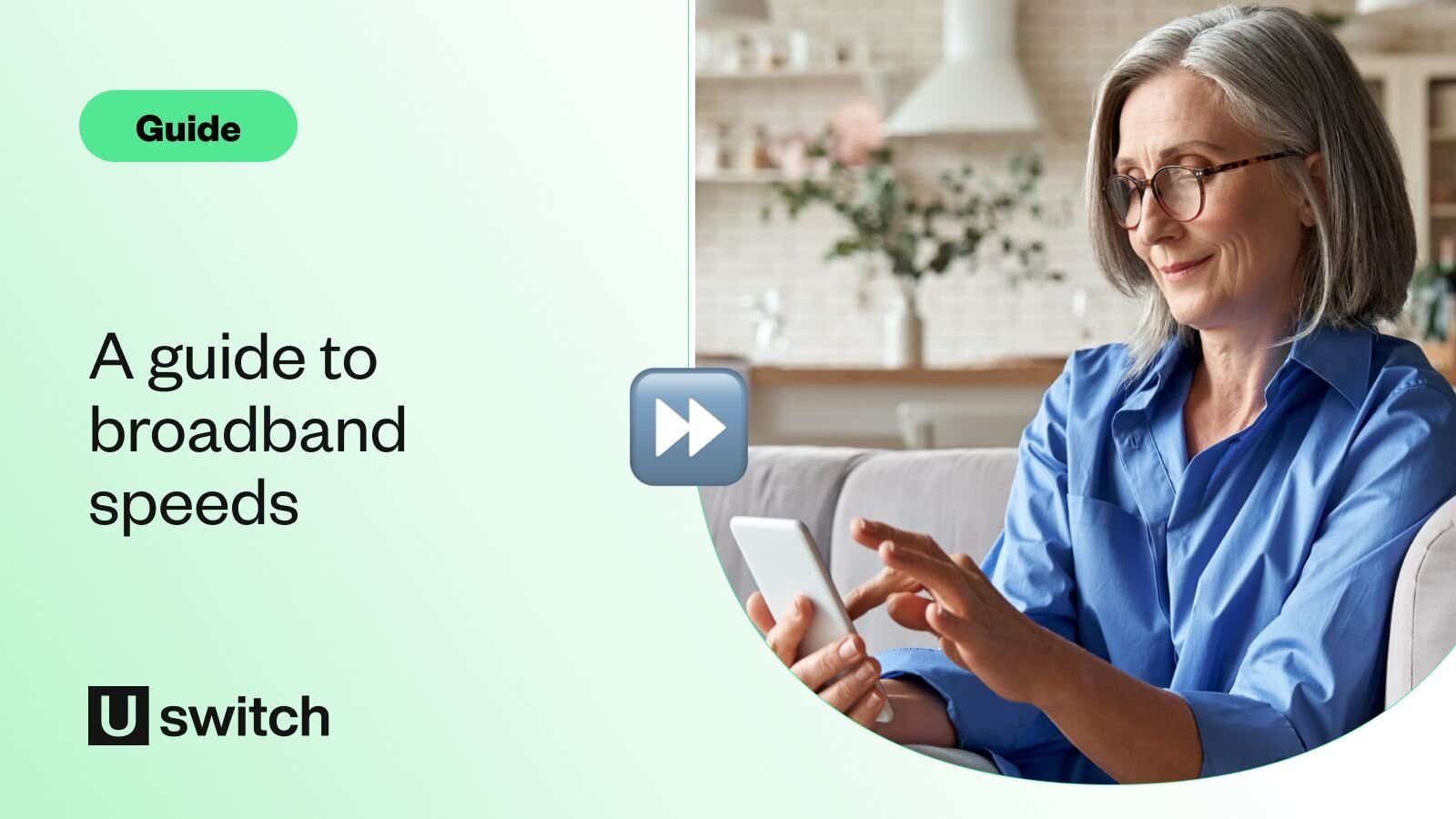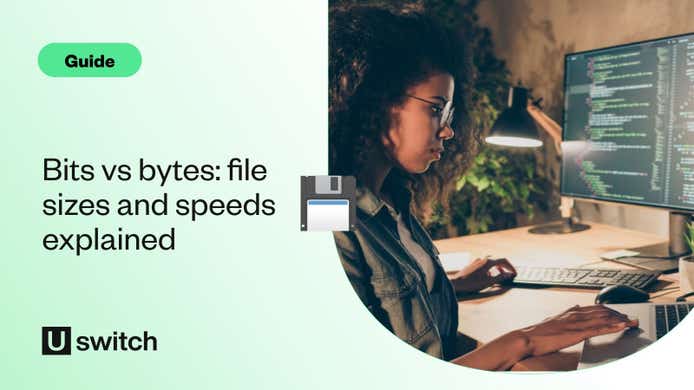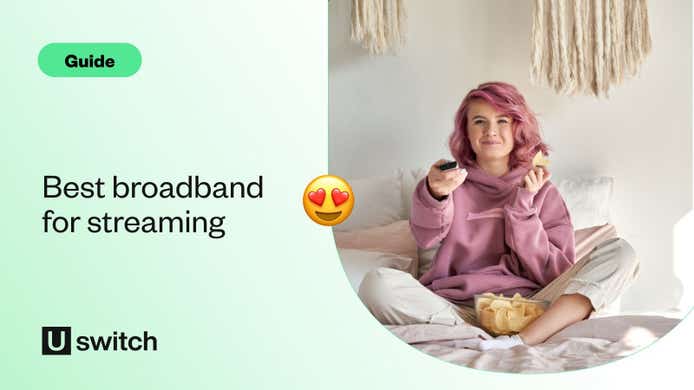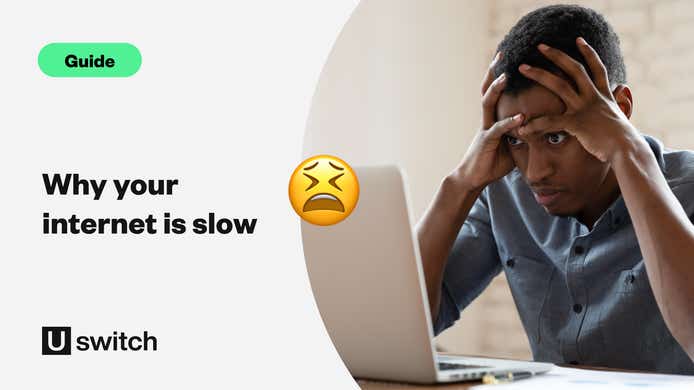Finding out what broadband speed is right for you could make all the difference on work-from-home days, video calling family and friends online, or keeping yourself entertained by playing games and streaming TV shows.
What is a good internet speed?
A good internet speed is one that matches your needs the best.
Common broadband speeds in the UK start from as little as 10Mbps and can go beyond 1Gbps - which is 100 times faster. A 'good' internet speed is fast enough to handle everything your household does online but isn't so fast that you're paying for a speed that you don't need.
The best speed guidance we can give is that nowadays, you should probably look for a fibre broadband deal first. Some providers still offer 10Mbps copper internet, but often at prices that are either similar or more expensive than the cheapest fibre deals.
For example, you can now get some fast full fibre deals from around £17 per month, which is even cheaper than some standard ADSL deals. So in many cases, a faster and more reliable fibre-optic connection is now cheaper to get than a slower standard broadband connection. This means you'll get more for your money if you go for them.
How fast is my broadband?
Just because broadband providers advertise average speeds doesn't mean you're actually getting that speed. Running an internet speed test is useful because you may not know what speed you're currently experiencing, and whether it's at the level that you officially pay for. Plus, the difference between 8Mbps, 50Mbps, 100Mbps and even 1000Mbps isn't as obvious in practical terms.
Test the speed of your broadband connection with our Uswitch broadband speed test. This can help you make a more informed decision when you compare internet speeds and packages before signing up.
Run a broadband speed test
Test your upload and download speed to find out whether you're getting the best connection for your area.
Can I speed up my broadband without changing internet providers?
Yes. If you use a wireless connection, you could improve your Wi-Fi connection by moving your router to a more central, open location in the house, or even changing the channels or broadcast type of your router.
You might find that a Wi-Fi extender helps you boost your router's internet signal throughout your home.
Learn more about Wi-Fi boosters with our guide.
If you're feeling particularly ambitious, you can even forward your router’s ports. This works very well for programs, games and utilities, but it can't be done for internet browsers like Internet Explorer or Firefox.
If you've done a few speed tests and you're not happy with your current Wi-Fi speeds, you can look to upgrade your connection with your provider. Just keep in mind that most providers will require you to sign up for another fixed-term contract when you upgrade.
Sign up for our latest broadband offers and expert advice
Get more expert insights, browse our latest exclusive offers and find money-saving deals from Uswitch.
What internet speed can I get in my area?
Within the UK, broadband speeds currently range widely from 8Mbps to over 1Gbps (1000Mbps), although the higher speeds aren't available everywhere - or with every provider - just yet.
The speed of broadband that you can get depends mainly on where you live.
Do you have access to full fibre or cable broadband?
Although part-fibre broadband is available to 97% of the country, the maximum speed this connection can offer is about 70Mbps. While this is still plenty for many households, full fibre or Virgin Media cable broadband - which is available to about two-thirds of UK properties - could provide more than 12x this speed, and more consistency with the connection too. Sometimes beyond 1000Mbps (1Gbps).
Are you in a rural or urban area?
Broadband has historically been faster in cities and larger towns, regardless of connection type. But there are now many smaller providers emerging across the country to give rural homes a local full fibre connection, which is the fastest, most reliable type of broadband available in the UK.
As a result, there's a chance you could get ultrafast broadband from one of these smaller brands (which are often called 'altnets') already.
How far are you from the telephone exchange?
If you're on a copper ADSL or part-fibre connection, your connection will potentially be slower if you're further from the exchange. This is because connections that still rely on copper cables are prone to losing their strength over longer distances.
Check and see what the average download speeds are where you live. Just enter your postcode into our tool below.
How many Mbps do I need for using the internet at home?
This depends on how you plan to use your broadband. Each household will place different demands on its broadband connection, and faster broadband speeds could make life much easier for you.
Broadband speeds for browsing online
When browsing online, checking emails, or scrolling through social media, you probably won't need very fast broadband speeds. Even an ADSL connection with minimum speeds of 1Mbps or less will be enough.
The problem comes when more than one person wants to use the internet at a time, or if you start using the internet to watch videos or make video calls. Then, you might need to boost your home broadband speeds.
10Mbps is a decent broadband speed for a small household that just browses occasionally.
If you won't be doing much with your broadband, you might want to look for a cheap broadband deal. Browse our range of affordable broadband offers to get a service for a low monthly cost.
Broadband speeds for streaming
Streaming services like Netflix, Amazon Prime and BBC iPlayer require broadband speeds of 1.5Mbps and above for standard definition (SD), about 5Mbps for high-definition (HD) and around 25Mbps for 4K streaming.
This amount is per device, too - so if you live with other people or run multiple devices at the same time, your household’s usage will quickly add up.
30Mbps+ is a decent broadband speed for small households that regularly use their internet for streaming at relatively good quality. But if multiple people at home enjoy streaming in the highest quality, you may need at least 50Mbps or higher.
Broadband speeds for gaming
If there's a gamer in your household then your internet will be working a lot harder than most. Video game files are huge, often well over 100GB, meaning the minimum recommended speeds often won't suffice.
For example, the new Call Of Duty: Black Ops 6 is roughly 140 GB in size, which means it would take about ten hours to download on a 30Mbps connection.
But if you add all the other devices being used in your home at the same time as a download, a 30Mbps connection will get clogged up fairly quickly.
If you have a committed gamer at home, it's best to look for broadband starting from 60-100Mbps, especially if you have multiple people using the internet at home.

Our gaming broadband hub
Find out what broadband speed and Wi-Fi setup you need for gaming with our catch-all guide.
Which is the best internet provider in my area?
To compare internet providers available at your address,you should first enter your postcode on our broadband deals page.
The best provider is the one that offers the service that's most suited to you. If you’re looking to get a faster connection, or simply a better broadband deal for the same speed, the better idea you have of what you want before you compare prices, the better.
Uswitch broadband provider reviews
Read our expert reviews of all of the UK's biggest broadband providers.
Why is my Wi-Fi speed so slow?
There are a few main reasons why your internet is slow, the most common being problems with your router, poor Wi-Fi signal, or too many devices running on a slower broadband connection.
Be sure to check the following if you’re struggling with slow internet:
- The position of your Wi-Fi router. Is your Wi-Fi signal being blocked by furniture, cupboards or walls? Try moving your router to a more open, central location within your home.
- The condition of your router. Is your current router up to scratch? If it’s old or damaged the signal may be compromised.
- The speed of your broadband package. Check your current broadband speed to see if it’s sufficient to keep up with your household needs. If anyone in your house works from home, downloads large files or plays games online, that’s likely to put a strain on slower broadband packages.
Why is my broadband connection slower in the evenings?
This depends on the type of broadband you're using. Broadband networks are usually shared across neighbourhoods, with the data required being transmitted to multiple homes at the same time.
The amount of people using a broadband connection in an area affects what's known as the contention ratio, which is the number of people using the area's telephone exchange compared to the coping capacity the exchange has for those connections.
Most people using broadband in their homes use their connected devices in the evening, so for those with copper or part-fibre internet connections tend to be a lot slower at these peak hours (i.e. 8pm to 10pm). The best time to use broadband at its fastest is between 12am and 8am when most people are sleeping.
Full fibre broadband
Fibre broadband using full fibre or fibre-to-the-premises (FTTP) technology is almost completely unaffected by distance from the exchange since the fibre connection goes directly to your building or home.
About two thirds of UK homes can access full fibre connections, and this type of broadband is rapidly rolling out to the rest of the country. So it's always worth checking to see if it's available in your area now.
Read our more detailed guide about full fibre, or compare our range of fibre broadband deals available at your home.
Compare fibre broadband deals
Find a great fibre broadband deal for you with speeds all the way up to 1Gbps available in most UK areas.




